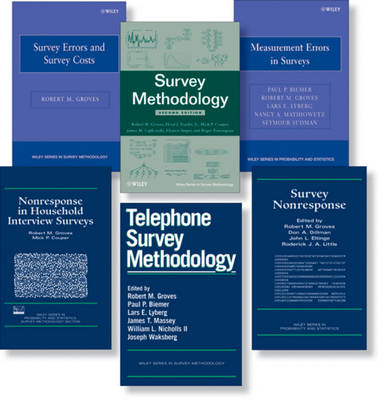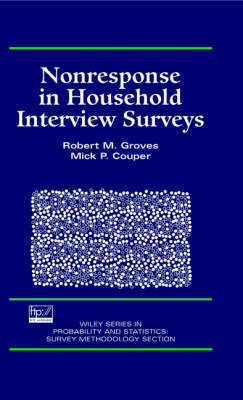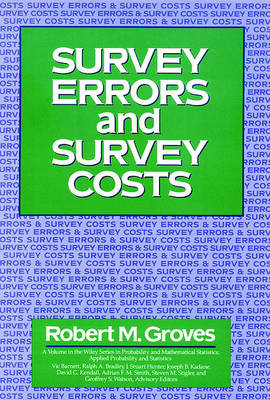Wiley Series in Survey Methodology
2 primary works • 5 total works
Book 546
Methods for Testing and Evaluating Survey Questionnaires
by Stanley Presser, Jennifer M. Rothgeb, Mick P. Couper, Judith T. Lessler, Elizabeth Martin, Jean Martin, and Eleanor Singer
The book's authors include more than two-dozen eminent professionals in a variety of fields related to survey methodology and questionnaire development, including names such as Gordon Willis of the National Cancer Institute; Paul Beatty of the National Center for Health Statistics; Paul Biemer of the Research Triangle Institute; Don Dillman of the University of Washington; and Natacha Borgers, Edith de Leuuw, and Astrid Smits of Statistics Netherlands. Copious tables, figures, and references, as well as an extensive glossary, supplement the high quality discussion throughout the text.
Book 561
Survey Methodology
by Robert M. Groves, Floyd J. Fowler, Mick P. Couper, James M Lepkowski, Eleanor Singer, and Roger Tourangeau
Survey Methodology, Second Edition by Robert M. Groves, Floyd J. Fowler, Jr., Mick P. Couper, James M. Lepkowski, Eleanor Singer, Roger Tourangeau (978-0-470-46546-2)
Nonresponse in Household Interview Surveys by Robet M. Groves and Mick P. Couper (978-0-471-18245-0)
Telephone Survey Methodology by Robert M. Groves, Paul P. Biemer, Lars E. Lyberg, James T. Massey, William L. Nicholls, II, and Joseph Waksberg (Editors) (978-0-471209560)
Survey Nonresponse by Robert M. Groves, Don A. Dillman, John L. Eltinge, Roderick J. A. Little (978-0-471396277)
Survey Errors and Survey Costs by Robert M. Groves (978-0-471-67851-9)
Measurement Errors in Surveys by Paul P. Biemer, Robert M. Groves, Lars E. Lyberg, Nancy A. Mathiowetz, and Seymour Sudman (Editors) (978-0-471-69280-5)
Nonresponse in Household Interview Surveys
by Robert M. Groves and Mick P. Couper
This book provides guidance and support for survey statisticianswho need to develop models for postsurvey adjustment fornonresponse, and for survey designers and practitioners attemptingto reduce unit nonresponse in household interview surveys. Itpresents the results of an eight-year research program that hasassembled an unprecedented data set on respondents andnonrespondents from several major household surveys in the UnitedStates.
Within a comprehensive conceptual framework of influences onnonresponse, the authors investigate every aspect of surveycooperation, from the influences of household characteristics andsocial and environmental factors to the interaction betweeninterviewers and householders and the design of the surveyitself.
Nonresponse in Household Interview Surveys:
* Provides a theoretical framework for understanding and studyinghousehold survey nonresponse
* Empirically explores the individual and combined influences ofseveral factors on nonresponse
* Presents chapter introductions, summaries, and discussions onpractical implications to clarify concepts and theories
* Supplies extensive references for further study and inquiry
Nonresponse in Household Interview Surveys is an important resourcefor professionals and students in survey methodology/researchmethods as well as those who use survey methods or data inbusiness, government, and academia. It addresses issues critical todealing with nonresponse in surveys, reducing nonresponse duringsurvey data collection, and constructing statistical compensationsfor the effects of nonresponse on key survey estimates.



